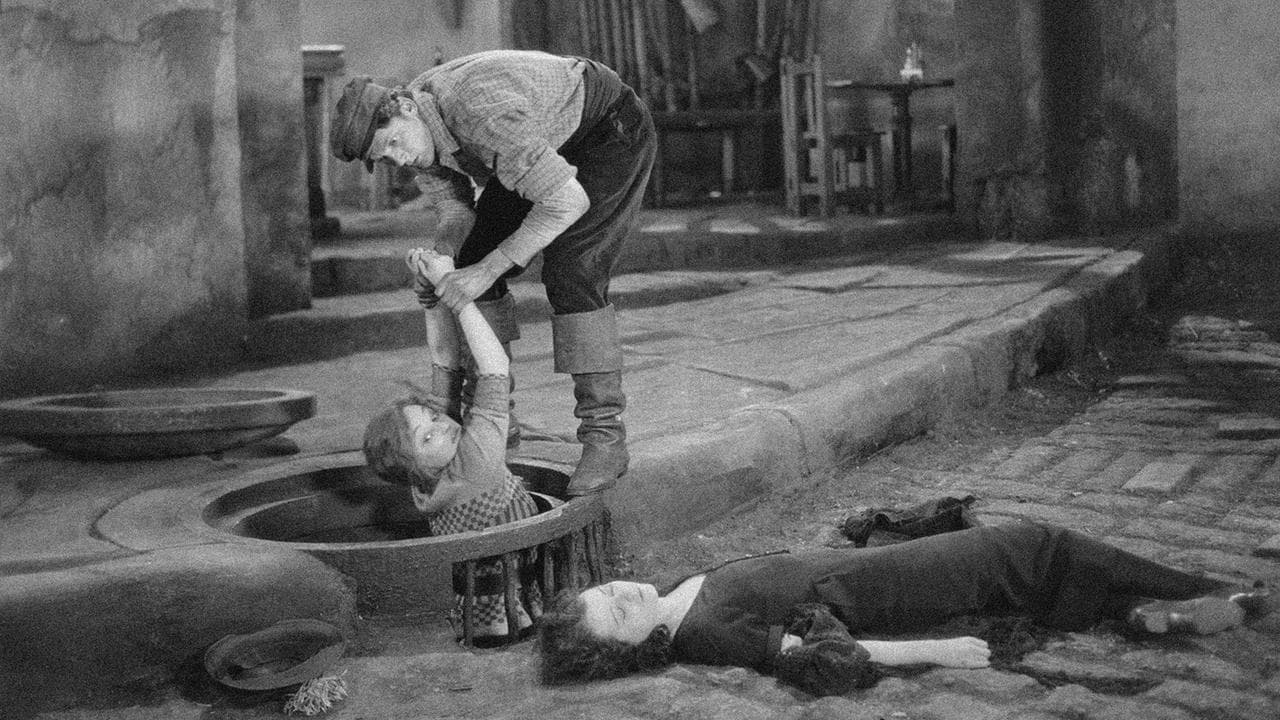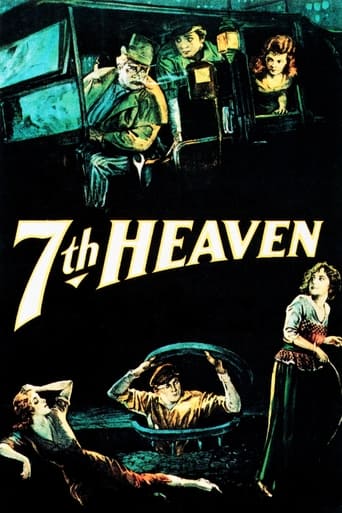

...but I live near the stars.Another sublime work by John Borzage,one of the greatest directors America has ever had.Charles Farrell and Janet Gaynor were the romantic couple of that era.Both were able to transcend the limitations they were working under,that is to say ,to convey any emotion without using voices.The soundtrack is particularly good including military marches ("la Madelon" sung in French,"La Marche Lorraine")as well as French folk songs ("J'ai Du Bon Tabac" "Fanfan La Tulipe")and even opera arias.Remarkable scenes: Gaynor,sadistically whipped by her sister ,and the relatives from South America,who would not take in those whores Chico (Farrell)discussing faith with his fellow men in the streets at night ,and the "miracle" : the priest telling him he would become a street-washer."The Bon Dieu" (in French in all the lines) cares about you!).Chico and Diane in the boy's apartment on the seventh floor : this is probably the most romantic scene in the whole silent age ,with the eventual exception of the scene in the church in Murnau's "Daybreak" which also featured Gaynor.These extraordinary lines by Chico: "I work in a sewer but I live near the stars.The historical episode of "les Taxis de la Marne" and the old man speaking of his old car :" She gave her life for France" .More than "the river" the complete version of which is unfortunately impossible to see,"Seventh Heaven" contained the seeds of what Borzage (and others) would do later The lovers against a hostile world subject reappear in "little man what now?" and "Mortal Storm" .All in all,the woman is stronger than the man ,it's her who builds the couple ;here,Chico did not want to say "I love you" ,he thought it was silly.And he is a remarkable fellow though; the loyal male friendship between Gobin and Chico predates the extraordinary camaraderie depicted in "three comrades" The priest and Chico's road to Damascus ,we will find them back in "Strange Crago" ,where Borzage's Christian concerns admirably emerge again.The telepathy,the supreme hour (the French title is "l'Heure Suprême" ) when the two lovers,although they are worlds apart,during which they are "together" not only influenced Henry Hathaway for "Peter Ibbetson" but also predates Borzage's own " I'll always loved you" where the two heroes communicate by music.The last pictures are so strong we do not know at first if it's reality or if Chico takes Diane away into a dream...or onto the true Seventh Heaven.But we,the audience, we were in the Seventh Heaven .Borzage was a genius,period.
... View MoreSome films are brilliant. Others are fine. This one is beyond category. Like Murnau's Sunrise, for instance, or Sjöström's The Wind, it is amazingly impossible to describe without going over the top. Especially since it concerns what the French Surrealistes dubbed "L'Amour Fou", the love that goes beyond reason, beyond society barriers, beyond the capacity to back down, and involves the story of a man(Charles Farrell) and a woman(Janet Gaynor) who discover passion through co-existing, and eventually meet up after one of them actually dies. Or does he?Beginning inauspiciously in a reconstructed, Dickensian Paris, the adventures of Chico and Diane start by an encounter, and in a scene that is paralleled by other Borzage films(A Man's Castle, Mannequin, Street Angel)has the man sheltering the woman at his home on the roofs to protect her both from prostitution and her family; This type of cohabitation is often the key to Borzage's love affairs in his melodramas, as if it was necessary to cohabit before discovering a connection between two people; at Chico's, they will co-exist, and fall in love, and even(As in Man's Castle and The Mortal storm)resort to a mock marriage before being separated by war: the necessity of fashioning a sacred link will elevate their love further. Chico is drafted into the French ranks; all the ensuing days though, they will "communicate" by taking an 11 o'clock break in whatever they're doing, in order to be reunited in thought, until one day Chico does not answer Diane's message. After a period of despair, Diane is ready to give him up, but as the war finishes, Chico unexpectedly returns: Borzage shows him in the street, blinded by a wound, but transfigured by love, walking through the cheers and congratulations of the people around him, as if both born again from the atmosphere of joy and indifferent to it, since his only goal is to see Diane again, to reach her before she stops believing in him. As the two lovers reunite they are all alone, in Seventh Heaven. This "ascension" motif is echoed in a surprisingly effective way by the fact that Chico works in the sewers when he rescues Diane(She is figuratively speaking "in the gutter" herself)and lives just under the roofs, where he can see the stars; thus we are foretold what the movement will be; Borzage had a set built to allow the vertical use of a camera in order to shoot the ascension of the stairways in one take. Another sign of the times is the expressionistic depiction of war by Borzage (Who will repeat the device in Lucky star two years later) war, seen in this film, is mud, explosions, sweat and fear, with no . It is a world entirely deprived of realism, but more simply it's a world that neither Chico nor Diane want to acknowledge. Apart from being very close to Murnau's experiments in stylization(Faust, Tartuff, Sunrise, The last Laugh), it is also a significant departure, on the part of an American director, from the realism of war as it was seen in The Big Parade(Vidor, 1925) or Wings(Wellman)the same year. Ford would partially repeat the move in his "Four Sons" in 1928 for... Fox. As everything in the film, war is a mental place, hence the possibility of escaping it mentally at a given time, or even simply an annoying obstacle between Chico and Diane, just as the notion of duty(Chico's duty as a soldier keeps him far away from his lover), or morals(If they submitted to the moral standards of their day, Chico would never offer Diane any shelter, let alone permanent accommodation, not even with a fake wedding): what we see in this film is desire elevated to the point of becoming a conduct. Chico desires Diane, or to be with Diane so much that he resuscitates. War, social conventions, death, nothing can stand in the way.Seventh Heaven is at first glance very usual melodramatic fare, but enhanced by the impressive skill of director Frank Borzage on the one hand, and also benefiting on the other hand very much from the rivalry of Murnau's Sunrise, that was also shot at the Fox Studios at the time. Everybody at Fox was invited to see what Murnau was doing, and the dailies provoked many a vocation. Ford, for instance, never recovered from seeing these images. Seventh Heaven is probably the first film having benefited directly from Murnau's influence, and it is a blessing that Borzage, without topping Murnau's effort, was able to almost equal it, by refusing to compromise by tampering with the lack of logic of the plot, or by allowing his two actors(Gaynor and Farrell, brilliant as ever together)free reign in the expression of their emotions, as suggested by the very genre of the film: Borzage's infamous tendency to weep on the shooting of his films is reported to have always been a key element of his direction on such films as this or his powerful MGM melodramas of the late 30s. To sum up, these twelve reels are an emotional experience, like the aforementioned masterpieces, and decidedly a key film from an exceptional period in the history of cinema.
... View MoreThere is some pedestrian acting in Seventh Heaven; furthermore, there are situations which in the world of today seem crass beyond belief. But anyone who can watch this film, with its original tints and Movietone score, without a complete sense of wonder at what film once was, and might be again if the business of films allowed, is dead emotionally and spiritually. It is no wonder Janet Gaynor won an Oscar for this, and other, film in 1927. Frank Borzage, who seems to be the forgotten director of all time, deserved sainthood for getting at least a credi8ble performance from Charles Farrell. His deft handling of the material and the camera is really astounding. His use of the helix as a symbol of re-birth, not original, is flawless and we still get fatigued walking with the two lovers up seven flights of stairs with his excellent crane shot. One suspects Lewis Milestone learned much from the war scenes and I wonder how Borzage would film Iraq, Afghanistan, or the World Trade Centre.Simply put, no cinema fan can comment intelligently on film without seeing this masterpiece. I prefer it to Sunrise, no easy thing to admit. I rate it a 9 simply because Farrell is objectionable in so many ways. But Janet Gaynor is a wonder and Frank Borzage deserves a university course of his own.
... View MoreThis could have been something awful. It's high schmaltz, really fever-pitched melodrama, and the plot relies on a huge number of coincidences. But it all works beautifully, through a perfect combination of acting, directing, and photography, not to mention the incredible lighting and set design. This is one of the great silent movies, and one of the great screen romances. Janet Gaynor had quite a year in 1927, turning in fantastic performances in this, as well as F. W. Murnau's Sunrise. 10/10A year later, Buster Keaton in The Cameraman would do a brilliant spoof of the famous staircase crane shot from Seventh Heaven.
... View More